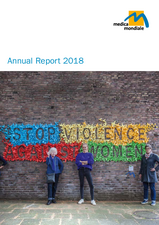medica mondiale Annual Report 2018
Dear readers,
2018 was an extraordinary year. Together with our partners, we celebrated our 25th anniversary. At the start of 1993, during the war in the Balkans, I started out for the first time to Bosnia. Together with local women experts, I founded the first therapy centre for women who had survived sexualised wartime violence in the city of Zenica.
From the outset, it was clear to us at medica mondiale that our working commitment would not end with the signing of a peace agreement. Rape has long-lasting consequences, both at an individual and at a social level, and we knew our working commitment would have to last just as long. Despite the awareness-raising work carried out by our colleagues over many years, the issue repeatedly drops out of public consciousness. Even today, hardly anyone in Bosnia and Herzegovina talks about wartime rape. Nevertheless, there are some indications that give me hope. Amongst these is the organisation “The Forgotten Children of War” founded by the daughter of one of our first clients, in co-operation with other children of wartime rape survivors. Together, they are ensuring that the issue has a place at the heart of Bosnian society.
One other positive sign reached us as at the end of 2018. The award of the Nobel Peace Prize to Denis Mukwege and Nadia Murad is an important acknowledgement of their efforts in combatting sexualised violence in armed conflicts. But it is still important to bear in mind that wartime rape cannot be reduced to just being a problem of the Democratic Republic of Congo or the so-called IS. Bosnia, Kosovo, Iraq and Afghanistan, Rwanda, Uganda, Burundi or Liberia: regardless of the country concerned, sexualised violence in armed conflicts is not the exception, but the rule. In times of war, it is omnipresent, because it is tolerated in times of peace.
It is just as important not to consign the issue to the international stage. We have to take a clear stance against sexualised violence and its taboo status in Germany, too. The violence experienced by women and girls in shelters for refugees should be as much a part of the public debate as the decades-long silence with respect to cases of assault in boarding schools and within the Catholic Church.
That is why our anniversary is a good reason to celebrate and, simultaneously, a demonstration of how important our work still is. With your support, we will continue to fight for the protection and empowerment of women and girls throughout the world: sustainably, without compromise and consistently feminist.
Dr Monika Hauser



